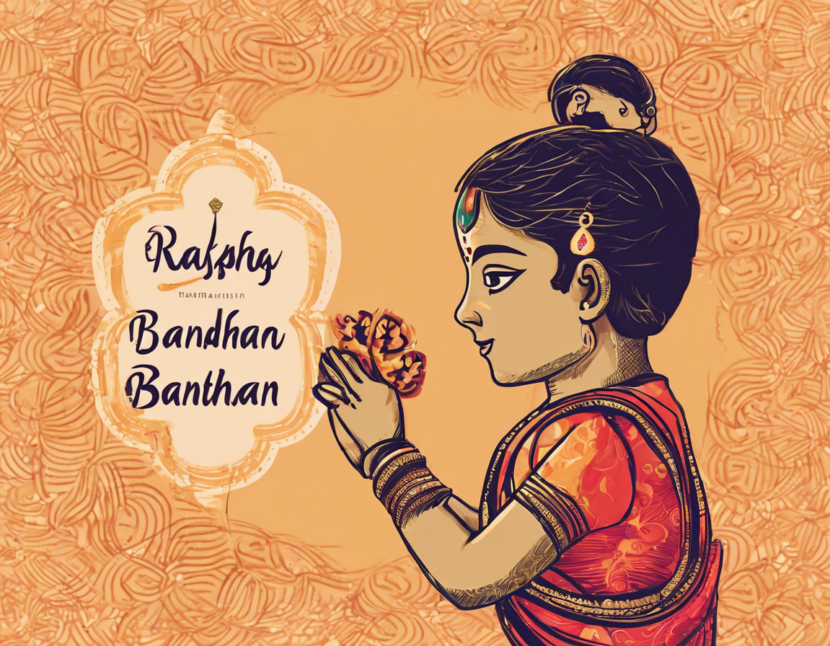Raksha Bandhan, also known as Rakhi, is an important Hindu festival celebrated to honor the bond between brothers and sisters. The festival holds immense significance in Indian culture, as it symbolizes the love, protection, and support siblings offer each other. Raksha Bandhan is observed on the full moon day in the Hindu month of Shravana, typically falling in August.
The Tradition of Raksha Bandhan
The central ritual of Raksha Bandhan involves the sister tying a sacred thread, known as a Rakhi, around her brother’s wrist. In return, the brother pledges to protect his sister and provide for her well-being throughout his life. The exchange of gifts, sweets, and heartfelt wishes adds to the festive spirit of Raksha Bandhan.
Significance of Raksha Bandhan
Raksha Bandhan signifies the bond of love and duty between siblings. The Rakhi thread is believed to have protective powers, safeguarding the brother from harm and evil influences. It serves as a reminder of the sibling’s promise to stand by each other through thick and thin, nurturing the bond of affection and loyalty.
Celebrating Raksha Bandhan
On the day of Raksha Bandhan, families come together to perform traditional rituals. Sisters adorn the Rakhi on their brothers’ wrists, apply a tilak on their foreheads, and offer sweets as a token of love. Brothers, in turn, present gifts to their sisters and vow to protect them from any harm. The day is marked by joyous gatherings, feasting, and merriment, strengthening the familial ties.
Embracing Raksha Bandhan in Modern Times
In contemporary society, Raksha Bandhan transcends traditional boundaries and extends to all relationships based on love and care. Sisters tie Rakhis on the wrists of not only their brothers but also cousins, friends, and even colleagues, symbolizing unity and harmony. The festival promotes the spirit of camaraderie and respect among individuals, irrespective of their gender or age.
Expressing Love and Gratitude
Raksha Bandhan provides an excellent opportunity to express emotions and strengthen bonds with loved ones. It serves as a reminder to appreciate the support and protection that siblings offer each other. Sending heartfelt wishes through messages, letters, or personalized gifts adds a personal touch to the celebrations, conveying love, gratitude, and good wishes for the future.
Frequently Asked Questions (FAQs) about Raksha Bandhan:
1. What is the origin of Raksha Bandhan?
Raksha Bandhan has its roots in Indian mythology, where the legend of Lord Krishna and Draupadi exemplifies the essence of sibling love and protection.
2. Who can tie a Rakhi on Raksha Bandhan?
While the festival traditionally involves brothers and sisters, anyone can participate in Raksha Bandhan to celebrate relationships based on love and mutual respect.
3. What are some popular Rakhi designs?
Rakhis come in various designs, including traditional thread Rakhis, embellished Rakhis with beads and stones, cartoon character Rakhis for kids, and personalized photo Rakhis.
4. How can Raksha Bandhan be celebrated in a virtual setting?
In the age of technology, Raksha Bandhan can be celebrated virtually through video calls, online gift deliveries, and sending e-Rakhis with heartfelt messages.
5. Is Raksha Bandhan only celebrated in India?
While Raksha Bandhan is primarily an Indian festival, its spirit of love, protection, and unity has gained popularity worldwide, with people from diverse cultures embracing its values.
As Raksha Bandhan approaches, let us cherish the precious bonds we share with our siblings and loved ones. May this festival be a joyous occasion to express our love, gratitude, and commitment to stand by each other, strengthening the fabric of our relationships.



